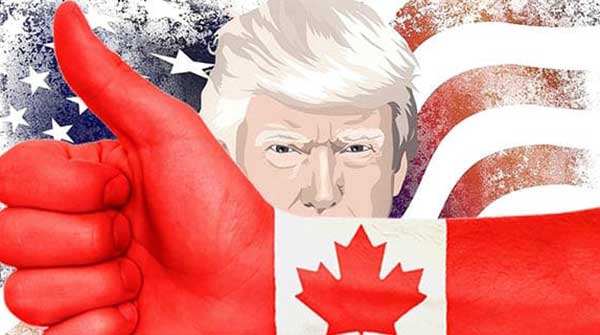We must continue to be cautious and not overly dependent on the U.S., regardless of the election outcome
 Donald Trump’s win in the New Hampshire primary last month all but assures he will be the candidate facing Joe Biden in November’s presidential election. Two obvious questions arise for Canadians: Can Trump win, and what will it mean for Canada if he does?
Donald Trump’s win in the New Hampshire primary last month all but assures he will be the candidate facing Joe Biden in November’s presidential election. Two obvious questions arise for Canadians: Can Trump win, and what will it mean for Canada if he does?
The appeal of Trump’s fascistic politics among conservative voters and politicians in the United States and Canada is very worrying. A Trump win would embolden hate groups in Canada and the U.S. as we saw after 2016.
Trump’s economic plan to deregulate government agencies, privatize education, cut public sector and climate spending, and “drill, baby, drill” would also be welcomed by parts of Canada’s political and business elite, notably in the fossil fuel and extractive sectors.
It is, therefore, important to watch how Canada prepares for the U.S. election and what Canada’s business lobbies are asking for from the federal government.
 |
| Related Stories |
| Does good industrial policy make good neighbours?
|
| Canadian oil and gas sector has huge impact in U.S.
|
| Canada’s economic competitiveness has slipped dramatically
|
Trudeau’s integration paradox
After Trump’s decisive win in the Iowa primaries, Prime Minister Justin Trudeau publicly worried that a Republican win in November’s U.S. elections “would not be easy” for Canada. Luckily, Trudeau suggested, Canada’s greatest strength when dealing with Washington is how integrated our two economies are.
For decades, Canadian elites have wielded Canada-U.S. integration as either a magic weapon for fighting off U.S. protectionism or the excuse to relinquish further independence in economic, regulatory, energy, or foreign policymaking.
Neither vision is true: Integration obviously makes us more vulnerable to U.S. whims, not less. However, there can be benefits as well as setbacks to that dependence.
For example, when U.S. governments get serious about improving worker protections and weakening excessive corporate rights in trade deals like the Canada-U.S.-Mexico Agreement, Canadian politicians can be pulled in the same direction. That’s a good thing.
The opposite is also true. U.S. deregulation of rail transportation, mimicked by Canada to create a so-called level playing field and to appease transnational rail companies, led directly to the avoidable Lac-Mégantic explosion that killed dozens in July 2013.
Integration and North American climate policy
Right now, the Biden administration seems committed to meeting U.S. climate objectives and is heavily subsidizing good jobs in new microchip, battery, renewable energy and other sectors. Canada’s economic integration with the U.S. means there can be benefits here to this manufacturing reshoring plan.
In fact, Biden’s climate transition is big enough that the Trudeau government needed to respond with significant investments of its own in EV supply chains to ensure the viability of Canada’s auto sector in this new future.
On the other hand, Trump’s team of Republicans, much like Canadian conservatives, are wrongly blaming government climate spending for the post-pandemic inflationary shock contributing to the cost-of-living crisis in both countries. They may reverse Biden’s advances.
A resulting backtrack in the EV transition could create chaos in the integrated Canadian and U.S. auto sectors but provide potential benefits to fossil fuel interests and their political backers on both sides of the border.
Constrained but not confined
In the early days of the first Trump presidency, Trudeau presented his government as a protector of liberal values and the rules-based international order. But in Washington, Canada stuck to the usual script by co-operating with Trump on cybersecurity, great power competition with China, defence, and immigration policy.
Despite Canada’s fallback to appeasement with the U.S., stable market access for our exports seems always at risk, especially at election time. We should, therefore, be wary of new Canadian efforts that go all-in on America, regardless of who wins the next U.S. election.
While Canada’s political and economic options in North America are constrained by the integration paradox, there is no need for them to be restricted by it.
Stuart Trew is a senior researcher at the Canadian Centre for Policy Alternatives’ National Office and the Director of its Trade and Investment Research Project.
For interview requests, click here.
The opinions expressed by our columnists and contributors are theirs alone and do not inherently or expressly reflect the views of our publication.
© Troy Media
Troy Media is an editorial content provider to media outlets and its own hosted community news outlets across Canada.

